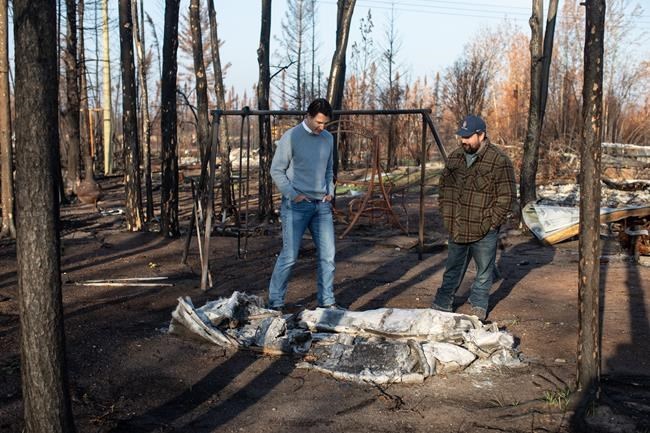YELLOWKNIFE — The premier of the Northwest Territories said Thursday she doesn't expect the North to get essential critical infrastructure before the next climate disaster, as Prime Minister Justin Trudeau visited the fire-ravaged region.
"The longer we wait, the more in danger we are and the more at risk we are to climate change," Caroline Cochrane said.
Cochrane joined Trudeau in Yellowknife to announce a jointly funded project between the federal government and the N.W.T., with the city providing the land. Fifty new affordable homes are to be built in the capital under the federal government’s rapid housing project.
Trudeau acknowledged remote communities face unique challenges with supplies and workers.
“The people who are, of course, hardest hit by this lack of supply are vulnerable people, including seniors, Indigenous peoples and those experiencing homelessness," he said.
“Housing is a complex issue, and we have to tackle it from different angles.”
Trudeau did not make any commitments to upgrade territorial infrastructure, but said talks with community leaders in the North are ongoing.
Cochrane has been critical of a lack of support from the federal government for infrastructure in the territory. The gap between Northern and Southern Canada became even clearer during this record wildfire season, she said.
Communications systems went down during some of the fires and Yellowknife had only one highway out when its 20,000 residents were forced to flee from an encroaching blaze.
Cochrane said she sent a formal letter to the prime minister outlining needs and expectations in the territory. The time to get started has long passed, she said, and she's not sure what progress will happen before the next climate crisis.
“I always consider myself optimistic, but I don’t consider myself naive," said Cochrane, who has announced she is not running for re-election in November.
The territory saw nearly 70 per cent of its population displaced by blazes this year.
Yellowknife residents remained out of their homes for three weeks in the summer. Flames didn't enter the capital but destroyed most buildings and homes in Enterprise, a hamlet of 100 people near Hay River.
About 20 residents have returned to Enterprise, but others are staying elsewhere in the territory and other parts of Canada.
Trudeau toured Enterprise on Wednesday, walking among burned-out homes and vehicles as he spoke with officials.
“Enterprise has long been known as being an unbelievably close-knit, welcoming community. It's the gateway into the Northwest Territories," he said.
“The devastation that we saw, people who built homes in the community over decades losing just about everything, is truly heartbreaking.”
Trudeau also went to Hay River and the nearby K'atl'odeeche First Nation. He made no commitments during the stops but said “we are there to rebuild."
"We are there as partners.”
Trudeau explained during several stops in the territory this week that environmental disasters are expected to increase, and Canada must be prepared.
“We must make sure we are keeping communities and the people who live in them safe, knowing it's going to get more difficult in coming years.”
This report by The Canadian Press was first published Oct. 12, 2023.
Kelly Geraldine Malone, The Canadian Press



